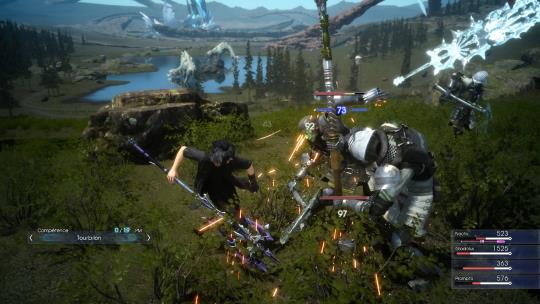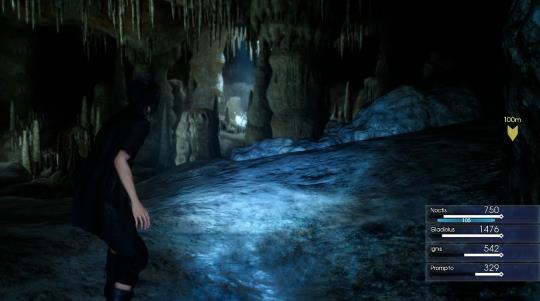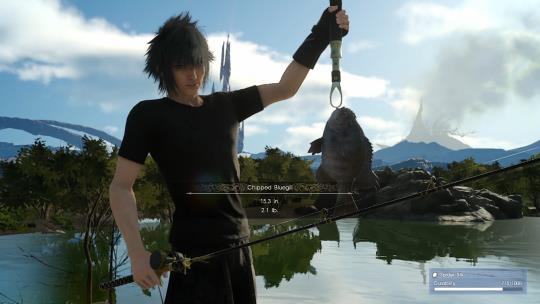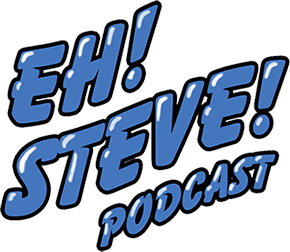Final Fantasy XV

I think it was for Final Fantasy VIII that I saw a magazine headline its preview with “Not Your Grandfather’s Final Fantasy”. The suggestion at the time, of course, being that the new title was such an evolution of the formula that it was a definitively new experience.
Instead, that cheesy headline is what comes to mind when playing Final Fantasy XV. Primarily prompted by its opening screen, declaring that it is a title for new and old fans alike, I cannot help but think of how not Final Fantasy this is. It makes use of a variety of familiar elements, but what brings me back – the reason to play this game – is completely different.
This is a Final Fantasy where the emphasis is gameplay and sidequests, not the story. While the franchise has sought to update and revise its gameplay in greater and greater ways since the Playstation, never has it made as large a leap as this. Similarly, never have the side quests and optional boss fights been such a large draw. In the past, only the most dedicated players would trudge through all of the side dungeons in hopes to obtain every hidden weapon, spell, or trinket. For all the times I played Final Fantasy VII, I never once did get Knights of the Round.
With Final Fantasy XV, though, the side content is the draw. The combat is not deep like contemporary action games Bayonetta 2, Devil May Cry 4, Bloodborne or Ninja Gaiden 2, but it is unique by focusing on Noctis’ teleportation ability. No matter the situation, Noctis is always the primary aggro driver in a group of foes. Warp-strike away and the enemy will divide their attention among his compatriots. As long as Noctis is in the fray, he is the main target.
This means the player is never just hacking and slashing at foes mindlessly. Not unless you want to upend your potions and elixirs to just pour down the prince’s throat. Leap into the fight with an appendage-breaking warp-strike, then leap right back out to reassess the situation. Lunge towards a foe occupied with an ally and backstab with a blindside strike, or time your attack to coincide with the A.I. partner’s efforts.
Amid all the frantically clashing blades and gnashing teeth fills a gauge fueling ally abilities. Wait for the gauge to fill and allow your allies to unleash their own particular brand of Hell.
It’s the sort of combat that keeps the player’s mind progressing from step to step. “Okay, took care of that guy. Let me get outta here, recover some magic points, and… ah, Gladio’s special move is ready. Unleash that, then… there, the weak one by Prompto. Warp-strike in, deal double damage, and circle around to team up with Ignis for a blindside strike while the enemy is reeling from its broken appendage.”

The bounty hunts are thus the more genius inclusion to the game. No doubt Square Enix’s editing tools make it easy to just select a tipster location, add in a hunt, select its rewards from a drop-down menu, and grant coinciding coordinates with a series of fields and drop-downs to determine the foe, the quantity, time of day, and level. While there are plenty of special hunts littered throughout, the majority of them are little more than “Go here, kill the thing, then report back”. So easy to include, yet capable of adding so much play time to the experience.
The drawback is that this is the first big indicator that Final Fantasy XV is an incomplete game. The elements the developers prioritized are incredibly well polished and executed. Monsters each exhibit different A.I.‘s and behaviors. The various dungeons all feel unique, exhibiting individual traits that change your approach just enough that your memory can differentiate each experience. Hunting the big monsters and exploring the dungeons are largely the game’s highlights.
The fishing mini-game is similarly in-depth and probably my favorite execution of the idea in any non-simulator video game. It’s a distraction that I frequently sank thirty or so minutes into whenever I came upon a fishing spot. The developers had a team thoroughly working on and polishing an experience that many players might have easily skipped over.
By contrast, the “farming mini-game” is hardly an activity at all. You simply warp to the plot of land, press a button to plant a seed, and then harvest and sell what grows a few days later. The rewards are often not worth what little time is invested to this simple task. There is no challenge to it, only time consumption. To call it “half-baked” would assume that they bothered to shove it into the oven at all.
Which is the game in a nutshell. Half of Final Fantasy XV feels fully realized and complete, but there’s a point in the story where the open-world drops away and the player is pushed linearly through the story. This is where the game is at its weakest because you can visibly see that the open-world was supposed to be double in size, and you can tell that these remaining dungeons were rushed a lot more than those earlier and sometimes optional dungeons.

The narrative itself is similarly hindered. While the game technically has all the information you need to comprehend the setting, character motivations often seem unclear or to change at the drop of a hat. The shift from open-world to linear adventure causes character behaviors to seem like inexplicable emotional outbursts. The reach of the villainous empire suddenly lunges out from the darkness after seeming to be a slowly building threat.
Despite only having three years to complete a five-year game, it feels as if Square Enix never changed the scope of the project. They were going to build it to be as large and expansive as the original design documents intended – right down to the second continent being entirely modeled and explorable, but without NPC’s, monsters, or events to populate it.
Thematically, it makes sense to have a huge chunk of the game to be slower; to meander about as Noctis ignores his destiny and opts instead for more time with his friends. By funneling players into a more linear series of concluding chapters would also fix the problem most open-world games run into when it comes to maintaining that sense of urgency and rising action. The problem is the game was not designed to take advantage of this and clearly had more story and game content planned out. That linear section was a rush job to get the game as shipment ready as possible.
Which is why it is often met as the weakest part of the game. The appeal of most open-world games is that they are interesting worlds with things to do, and Final Fantasy XV manages to offer players monster hunts as its primary activity of choice. During this time the narrative slowly pushes forward, and the player has the opportunity to get to know the four primary characters. However, by rushing so much character development and narrative in a short span of time, the emotional weight that Final Fantasy XV drops onto the player’s shoulders just ends up awkwardly falling onto the floor.
It can hit the player “right in the feels”. It can also, however, come off as melodramatic and self-serious.
I do love Final Fantasy XV. I love it for what it succeeds at and I love it for the vision I can so obviously see. I also hate it because I know it could have been so much better if they just finished the damn thing.


